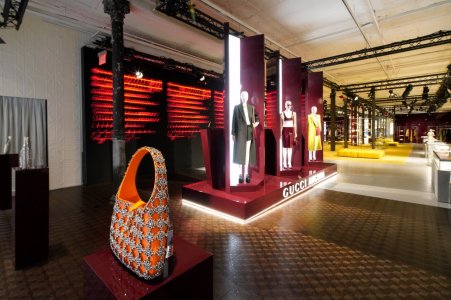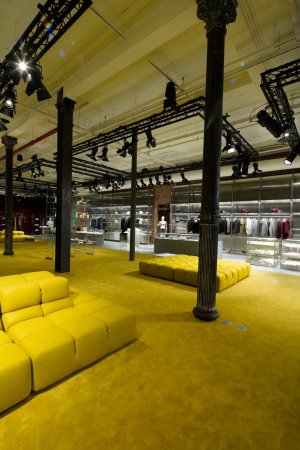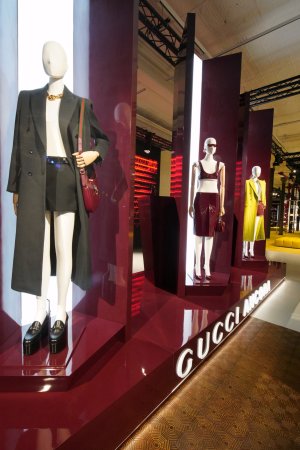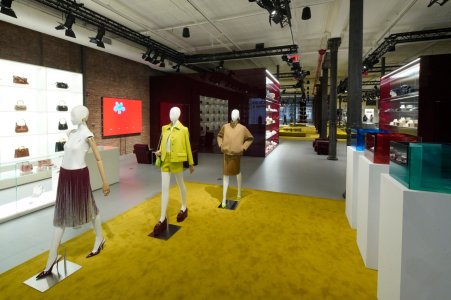Kering Eyewear 2023 Sales Reach 1.5B Euros
In an exclusive interview, president and CEO Roberto Vedovotto mapped out the strategies that have allowed the company, which celebrates its first decade in business this year, to become the second-largest luxury eyewear manufacturer in the world.
By LUISA ZARGANI
FEBRUARY 9, 2024, 12:01AM
MILAN — Kering Eyewear president and chief executive officer Roberto Vedovotto is not one to look in the rearview mirror, but reporting a milestone 1.5 billion euros in sales last year and marking the 10th anniversary of the company in 2024 are good enough reasons to take stock of the path carved out so far.
Kering Eyewear was a pioneer in changing the business model for luxury groups with regard to the eyewear category, straying from the well-trodden licensing business model. Vedovotto, who was previously CEO of Safilo Group for 10 years, exiting that company in November 2013, remembers being met with much skepticism in the early days.
“People were wondering if we would be able to put together the manufacturing capacity and to actually make it work since the eyewear industry is very complex and had been super stable forever. It is an industry where nothing really changed for many, many years. And to do this, it took a lot of audacity and courage,” he said, crediting Kering chairman and CEO François-Henri Pinault’s belief in the project.
Kering Eyewear revenues last year climbed 35 percent, compared with 1.1 billion euros in 2022. Sales of 1.5 billion euros are wholesale, since the company does not have any retail store and has no plans to pursue this avenue, said Vedovotto.
Reflecting the contribution of Maui Jim, which was consolidated Oct. 1 two years ago, and the newly acquired scale, operating profit rose to 276 million euros, a margin of 18.4 percent of revenues, compared with 203 million euros in 2022.
Growth at constant scope was extremely solid in all main markets, and was driven in particular by a very strong upturn in Asia-Pacific and strong growth in Europe.
“The reason why I thought we could have done something different was that, of course, the eyewear industry is huge, it is underpinned by growing trends and it is very profitable,” continued Vedovotto. “Moreover, sunglasses represent a relatively accessible form of luxury and have one of the best conversion rates within the accessories in the luxury industry, representing a great opportunity for brands to attract new, aspirational clients.”
Pinault asked Vedovotto to follow three guidelines while internalizing the category: “Make sure it stays much closer to the DNA of each brand, guarantee the highest possible quality for the product, and aim at a selective distribution to make sure that our products are in the places where they belong.”
The results registered so far are “the best testimony that if you have passion for what you do, if you work hard, and you are very committed, if you work as a team, and you enjoy what you do, the sky is the limit. Of course, we need to always stay super humble and cautious as market conditions are volatile,” said Vedovotto. “We are confident that we can keep growing, progressing, and doing better for all stakeholders: our people, our shareholders, our customers, our partners and our suppliers.”
Sales in 2015 amounted to 10 million euros. The company has logged a compound annual growth rate of 87 percent since then.
Local chains and the “three Os” (opticians, optometrists and ophthalmologists) constitute the main channel for sales under license by brands managed by Kering Eyewear, representing around 50 percent of total sales in both 2023 and 2022. The company also cited a continued recovery in travel retail.
At the end of June last year, Kering Eyewear acquired French company UNT(Usinage & Nouvelles Technologies), one of its key suppliers in the production of high-precision components, a key step in the company’s industrial development and innovation strategy. This followed the acquisition of Manufacture Kering Eyewear — previously Manufacture Cartier Lunettes — in France in 2017 and the purchase of a stake in Trenti Industria Occhiali in Italy in 2019.
The acquisitions have helped Kering Eyewear grow, but Vedovotto outlined the three phases of the company’s growth strategy, which passed through developing eyewear for the Kering Group’s houses, followed by a partnership with Compagnie Financière Richemont, developing eyewear for Cartier and their other brands. The third stage, started in 2021 with the acquisition of Lindberg and continued in 2022 with Maui Jim, was to add proprietary brands.
Asked about future acquisitions, he said “of course, we always keep our eyes open,” but he added that Lindberg and Maui Jim are “quite complex,” and are in an integration and transition phase. “Our goal is to preserve each of their DNAs, and to invest to help them further develop, in order to make sure that we are able to meet customers’ needs, expanding them internationally and towards a much broader consumer target.”
For example, he said, Lindberg has been very successful in Northern Europe and Vedovotto believes there is the possibility to expand further in other areas, and to reach out to younger audiences. The same applies to Maui Jim, which is “extremely successful, very profitable, but mostly in the United States.” The goal is to expand the brand internationally.
Maui Jim just launched Collection ‘Ekahi, and its advertising campaign with global ambassador Evan Mock is aimed at reaching a younger clientele. “We thought it was very important to maintain the heritage of Maui Jim, and Evan was the perfect guy as he is from Hawaii, we share the same family values, but, at the same time, he’s also an international and very eclectic person, a younger talent. He lives in New York. He’s an actor and he’s a model. He’s an influencer, a skater, and a surfer,” said Vedovotto.
Maui Jim “has the best sunglass lenses in terms of eye protection in the world. I think this is a time when people want to make sure they live longer and better. And protecting your eyes is an important part of that. So we are here to try to make it better for everyone. I think there is a brighter future in front of our specific industry.”
Lindberg and Maui Jim are “very important because these two brands are the best in the market for prescription and sunglasses, respectively.” Lindberg, he said, “has been changing the industry because it is the first prescription frame fully made in titanium, making it extremely light and comfortable to wear all day long. And very importantly, there are no screws, which is truly unique.”
He touted Maui Jim’s UV protection, anti-glare, and anti-reflection as “something that does not exist in the market. On a day like today, certainly cloudy in Italy, you wear a pair of Maui Jim outside and you see colors, you see things that you wouldn’t see with another pair of sunglasses. And that immediately puts you in a better mood. And that is true also of course when you are outdoors, in nature or at the sea.”
The executive confirmed the goal was to strengthen the control of the supply chain and “have the flexibility to work with the best partners around the world in terms of competences, specialized in terms of materials and techniques.”
In Trenti, “we doubled the workforce and more than doubled the volumes that we produce, investing in improving the performance, making sure that we pay attention to the community, and that we hire additional people in order to make the processes better and more efficient.”
Maui Jim and Lindberg are complementary to the portfolio of Kering Eyewear brands, which range from Zeal Optics, Cartier, Gucci, Saint Laurent, Bottega Veneta and Balenciaga to Chloé, Alexander McQueen, Montblanc, Dunhill, Alaïa and Puma.
“I think that the industry has consolidated and that, going forward, there might be additional consolidation. Furthermore, I think this will remain a healthy industry, also thanks to a significant part of the business which is very stable: prescription frames. There is always a need for increasingly better products and the awareness on visual protection is increasingly higher as protecting your eyes is key, and going forward it will be even more important.”
He admitted the market in 2024 will be “challenging, the geopolitical situation is not easy. In Asia, I think that we need to be very careful, especially with reference to further growth of some of the main markets, which have slowed down. So we need to make sure that we keep offering the best product and the best service to our customers.” With the elections and the macroeconomic environment in the U.S., “we need to remain vigilant. And I think that in order to keep being successful, you need to have the best product, the best collection, and the best technical characteristics.” For these reasons, he said “we need to remain super humble, and to have our feet very solidly on the ground.”
Asked about possible dream projects going forward, he said, “I would like to keep performing like this. And we know that it is very difficult, given the size of the company and given the challenges around the world. But that’s what I would like to do.”
More sustainable collections are a key objective for the company, “focusing on reducing the consumption, empowering people, and fostering innovation. It’s really what we’re trying to do because we feel strongly about this. So for us, the three pillars of our company — Care, Collaborate, Create — are very closely interconnected. The best is yet to come, as my motto is never, never, never give up. I think that the real luxury that I have is that I’ve always been working with very supportive shareholders. And this is rare.”







